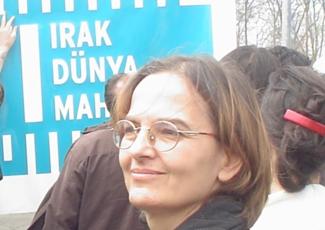THE BRUSSELLS AWARD FOR SOLIDARITY: Will Ayse Berktay be released?
by Mike Powers on 06-03-2013
| BRussells Tribunal |
In a recent visit to Istanbul I experienced both hope and growing optimism that Ayse Berktay, the recipient of the 2013 BRussels Tribunal Solidarity Award might soon be released.
I was able to meet briefly both with members of her family and her anti-war group who support the efforts of the Turkish PEN club to demand her release. They inform me that Ayse is strong, determined and in good health. She has been kept imprisoned since her arrest over 18 months ago. A group of international lawyers and peace activists were present at the last session of the trial held in July, 2012. A new session, the fourth, is expected to begin in early March.
To date, the prosecutor has yet to finish reading the charges against the group which are more than 2800 pages long! What is unusual is that no specific charges are directed against the individuals. Instead, their documented legal participation in activities of the BDP is being cited as proof of “guilt by association” with others who have publicly called called for talks with the outlawed PKK group. Yet, Ayse´s trips to attend a number of sessions of the World Tribunal on Iraq and different Social Forums to take up the question of the invasion and occupation of Iraq are cited as evidence against her, events long before she became associated with the BDP women’s group. It should be noted that the BDP is a legal organisation, even if a number of the MPs associated with it were elected as independents, such as the three from Istanbul. Even the translation of a Voltaire text found at her home which was to be included in a history of European-Turkish relations was listed in the appendix as proof of “anti-Turkish” propaganda! Nothing could be farther from the truth. No one I have ever met in many trips to Turkey was as proud that the Turkish people, the 83% of us as she described them, stood up to the US and refused to let Turkey be a platform for attacks against Iraq. This popular mandate of the peace-loving Turks must also be seen as a mandate even to Turkish politicians to find a peaceful way of ending their own decades- long internal conflict, in which thousands of innocent civilians and soldiers have suffered. However, the right to freedom of speech and freedom of association are also of central importance to the people of Turkey, as well as to public opinion in a Europe with which Turkey aspires to greater cooperation.
While the case of the 120 of the 205 arrested and now on trial in the latest sweep against critics of the continuing violence has gained some attention in Turkey and abroad, it is clear that hope of progress towards their release has to be seen in the context of the ongoing contacts between the government and the imprisoned Kurdish leader about breaking the deadlock. As the outlawed armed group’s demands have shifted from separatism toward autonomy, the government has indicated it might be open to municipal decision-making.
That might allow for use of the Kurdish language in some areas. In this trial for example the earlier refusal of the court to allow the use of Kurdish by many of the accused during the proceedings led to a walk out protest by many of the lawyers.
There are hints that the Kurdish group may release some of those it holds as hostages, many of whom are civil servants. It is in this framework that it is hoped that the government may announce the dropping of charges and release of those intellectuals and activists held in the recent mass arrests. A date mentioned is the Kurdish holiday on March 21. This however would not be in time, if it at all happens, to allow Ayse to travel to Brussels to accept the Solidarity Prize. Her symbolic absence will in that case only serve to bring further attention and outrage at her continued confinement as well as that of her fellow prisoners.
Mike Powers - Irak Solidaritet - Sweden / member of IAON

No comments:
Post a Comment